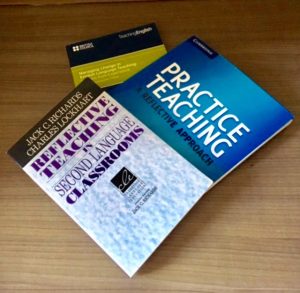
Professional Development Makes All the Difference
by Roseli Serra.
As I wrote in my previous post, 2012 was a very peculiar year in my life. It was then that I got to know teacher communities on Facebook, built my professional learning network (PLN), and first heard about online professional development (PD) and iTDi.
Before that I had always been concerned about both my personal and professional development and never waited for any institution to support me. It was good to have support when I could. If not, I managed to save money and time to do face-to-face courses and attend conferences which, I believed, would bring good results for me as an educator.
Online professional development was a great discovery. Webinars and online courses I attended, discussions in Facebook groups and communities, and Advanced Skills Courses promoted by iTDi made a crucial difference on how to see education, how to grow professionally, and how to help those who seek development.
I started as an attendee and afterwards I was invited to deliver webinars, moderate courses, be a keynote speaker and a plenary speaker for worldwide audiences.
The size of the audience doesn’t actually matter, but the difference you make might be compared to those tiny drops that will eventually fill a jug. Even if you think you are doing something of little importance or if you consider yourself not to be that famous person, believe: you are reaching hearts and minds and influencing other educators in a positive way.
I have lots of amazing examples to list how PD has changed my life. Among those, I’d like to highlight some of the Advanced Skills Courses held by iTDi. For me, it was fantastic to interact online and study with the authors whose books I used to read. It was fantastic to get to know educators from all over the world and their opinions. The courses I took gave me a lot of food for thought, a lot to learn from different cultures, colleagues, tutors, and friends. But most of all, I was once again made sure that every teacher matters. Isn’t it great?
We know that teaching is a very hard job. Those who really want to make a difference will seek out new possibilities to include in their practice and new methodologies that will contribute to their work and the quality of teaching.
Professional development as an ongoing process is an important issue since teachers need to be aware that training should be continuous and related to their day-to-day life in the classroom. As Romanowsky (2009, p.138) states, “continuous education is a requirement for the current times. So teachers cannot stop studying.”

Finally, teacher development is not only built by accumulation (courses, knowledge, or techniques), but also through a work of critical reflexivity on the practices and continuous (re)construction of a permanent personal identity.
The number of strategies and suggestions for PD is huge. I’ll suggest some of the ideas I learnt from Jack Richards and that have helped me a lot along my career as a teacher and as an educator.
- Talk to people who have taken part in a PD activity. Sharing is caring.
- Decide on what kind of support you will need. Remember nobody is an island.
- Select a colleague to work with. Two is better than one.
- Set realistic goals and establish a time frame. Plan and be organized. This way your results will be a lot more effective.
- Evaluate what you have learned and share the results with others. Show your work and be humble to learn from your peers.
- You might find, as you progress, that there’s an area of knowledge you need to know more about. So never be afraid to ask for help or advice.
There’s nothing wrong with asking yourself, “Can I do it better?” Doing this is not a sign of being an underperforming teacher. In fact, it’s quite the opposite: it shows you are brave and professional.
Wishing you all a year full of joy, hope, and achievements!



